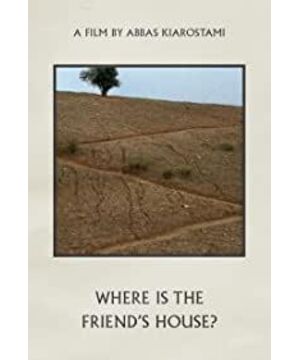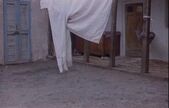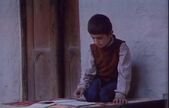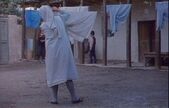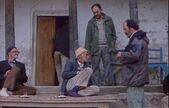In late July, in order to hand in my job-hunting assignments, I thought about the Abbas movie I watched in late June and wrote it down. This is my favorite director this year, and a rare favorite in my limited movie viewing history. When I wrote it down, I was in a hurry. When I read it again after a week, I was even more disgusted with my writing. This was sent in the form of a tweet on the public account. Today, my mind flashed, why not organize it and post it in the film review.
Image Poets in the Stream of Life | Abbas Kiarostami
Imagine such a story.
In the first part, the director constructed a fictional story: a little boy took the wrong workbook and went over the hillside to Ling Village to find a friend's home.
In the second part, the two young actors who starred in the first part grew up, their city suffered an earthquake, and the director took his son and set out to find them. On the way, people in the disaster-stricken areas of Iran met, including newlyweds, young people, and old women. Everyone unexpectedly showed an optimistic and strong attitude.
This kind of story stems from the director's personal experience, and the audience will fall into a real hallucination. After all, the earthquake really happened, the disaster area really exists, and the Iranian people who meet on the way are also real faces. In the film, the director invited an actor to play himself, and the audience may start to waver...
In the third part, the story unfolds like this. A director (unlike the first two) was about to make a romance, recruiting actors in the Iranian countryside, and after some mishaps, the film finally started. It turned out that the scene that the director wanted to shoot in the film was the newlywed couple that appeared in the second part. You see, at this time, Abbas broke the truth that the audience misunderstood, and told you once again that the truth of the second part turned out to be an illusion.
This is the work of Iranian director Abbasskiyarstami. The trilogy is "Where is My Friend's Home", "Life Flowing" and "The Lover Under the Olive Tree". This is the most shocking director I have encountered this year. When watching the film, I have this idea countless times: Abbas must be a poet. The language of the film is extremely beautiful, and the flow of time is felt smoothly without being lengthy. But the most touching thing is to break my stereotype: it turns out that movies can be made this way.
Mixing the real and the real is probably the inspiration given to Abbas in "Close-Up". This story is based on a piece of news: Unemployed workers pretended to be the famous Iranian director Mohsin Makmalbaf, and won the trust of the wealthy Ahan Kah family and borrowed money from them to make a movie. Later, they were found out and entered the court. In the end, the Ahan Kah family withdrew the lawsuit, and the director Mohsin Makmalbaf found the worker and took him to revisit A Khan Kah on a bicycle.
For a long time, except for documentaries, the language of images is fictional to me, but Abbas breaks through this stereotype and reconstructs his poetry, which is a flowing poetry.
In 2005, Abbas published a collection of poems "A Wolf Lying in Wait", translated by Michael Beard in English and Xuan Zhang in Chinese.
On July 4, 2016, Abbas passed away in Paris. He was invited to Hangzhou, China to shoot a movie, but he never thought it would become a lifelong regret. Nishikawa wrote a tribute:
I pretended not to know about Abbas Kiarusdami's great contribution to world cinema. I pretended not to have seen his movies. I only read his poetry. I was surprised to hear that Abbas Kiarusdami was also a poet, and my surprise was even greater when I read his poetry, because his poetry is unlike anyone else's poetry I have ever read. Abbas seems to be a man with a notebook in his pocket who will jot down what he sees and thinks; if not, he is a man who can turn an instant discovery into a lasting state of discovery. Thinking about the fact that Abbas wrote poetry, I feel that this should be a matter of course. Abbas Kiarusdami seems to only write short poems, shorter than the five-character quatrains and seven-character quatrains in ancient China, as short as Japanese haiku. But according to Ahmad Kalimi, Haqq and Mike Beard, two translators of the English translations of Abbas' poetry, the dynamism and acceleration of Abbas's poetry is rarely seen even in haiku. I think there is another difference between Abbas' poetry and Japanese haiku, that is, Japanese haiku is a poet who intercepts poetry from nature and life in time with the participation of understanding, while Abbas uses his epiphany-like Capture, give life poetic or anti-poetic. Maybe "poetic" is not an accurate word, it should be called "taste".
Abbas's short poems, tender and deep, here are some excerpts.
31 I want to share more
because of you
Lonely
32
you are not there
twenty-four hours a day
no more, no less
You are
Profit and loss
indefinite
33
with you
I am in pain.
alone
I am afraid.
Where is my "no-self"?
34
i got a letter
expedited delivery
full of hostility
39
a crumbling bridge
a passerby
walk firmly on it
40
I stepped into a narrow path
with hardship
aimless
View more about Where Is the Friend's House? reviews


